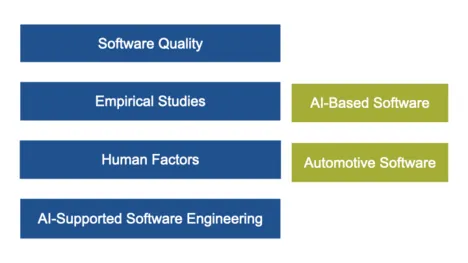Research
Software is the material for the 21st century. All innovations are somehow driven or influenced by software. Therefore, building high-quality software continues to be a central societal and economic challenge. As Chair of Software Engineering, we see our responsibility in finding and evaluating techniques, methods, and tools to better engineer software. To achieve this, we focus on four perspectives of software engineering methods:
- Software quality: Software is only helpful if it is of high quality. Quality can mean many things, and our core competency is that we can bring different views and quality attributes together in comprehensive quality assurance. This includes definitions, measurements of quality, and quality assurance techniques such as testing and static analysis.
- Human aspects: Yet, achieving high-quality software is more than just a technical problem. We work from the perspective that humans need to be the center of software engineering processes – be it the engineers themselves, end-users, or other stakeholders. We need to understand them and explicitly consider them in everything we do.
- Empirical studies: All techniques, methods, and tools need to reliably show their positive impact on the goal of high-quality software. The only way to do this is to run empirical studies, such as case studies, experiments, or surveys, to objectively evaluate these impacts. Therefore, most of our contributions are empirical or contain empirical validations.
- AI-supported software engineering: We have used machine learning and AI techniques to help software engineers gain insights and boost productivity. Our focus has been on using bots as helpers and artificial team members, as well as utilizing large language models.
We apply these four perspectives to any software in basic and applied research projects. We like to collaborate with industry from all domains on these topics. Yet, there are two focus domains in which we have particular expertise:
- Automotive software: The automotive industry has been in an impressive transformation for the last two decades and is still evolving. With current trends, such as autonomous driving, connected cars, and software-defined cars, software for vehicles has become a complex but vital challenge for the automotive industry. We have been working with automotive companies for two decades on various aspects, including software architectures and quality assurance.
- AI-based software: Our chair is also associated with Cyber Valley, Europe’s largest AI research consortium. We use AI techniques for software engineering problems. Yet, more importantly, we focus on how to build complete and operational software systems that contain vital AI components. These aspects are essential for the success of AI in practice but are rarely considered by core AI researchers. Therefore, we bring our expertise to AI systems and, thereby, enable its application in new areas.
